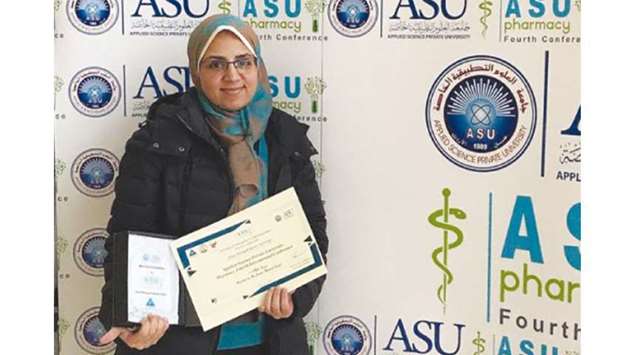Qatar University’s College of Pharmacy (QU-CPH) MSc graduate in clinical pharmacy & practice, Alaa Soliman conducted a study to develop a critical appraisal tool of clinical pharmacokinetics studies, the first of its kind in the world, in her master’s thesis.
Titled “Strengthening the Quality of Clinical Pharmacokinetic Studies: Development and Validation of a Critical Appraisal Tool for Clinical Pharmacokinetic Research”, the project aimed to identify quality markers of clinical pharmacokinetics studies to be used to develop a valid and reliable critical appraisal tool for assessing the quality of clinical pharmacokinetics studies.
This study was conducted under the supervision of CPH assistant professor of pharmaceutical sciences, Dr Ousama Rachid, and co-supervised by clinical associate professor Dr Shane Pawluk from Faculty of Pharmaceutical Sciences in the University of British Columbia in Canada, and associate professor, Pharmacy Education Dr Kyle Wilby from School of Pharmacy in Otago University in New Zealand.
The project included a systematic review to identify quality markers of clinical pharmacokinetics studies, followed by a modified Delphi process to achieve expert consensus regarding the formulated questions from the identified quality markers to develop critical appraisal tool for clinical pharmacokinetics studies. Finally, a psychometric analysis was conducted to evaluate the validity and reliability of the developed tool.
This project is in line with Qatar National Strategy by 2030: improving the quality of research to enhance the effectiveness and the quality of care provided to patients. Additionally, this tool will be used by different end-users around the world once it gets validated and published. It will guide researchers about the most important quality markers that they have to consider while conducting their research as well as reporting it in addition to the ClinPK statement reporting guidelines. It will guide policymakers like World Health Organisation or Food and Drug Administration to take decisions on approving medications to be used to treat different diseases.
The outcomes of this research project comes very timely now, as it may specifically be used in such critical conditions like the novel coronavirus pandemic to help health care providers make rational decisions with regard to medications that can be used in specific groups of patients. Additionally, it will improve students’ knowledge in different medical universities around the world about the quality markers that they should consider to evaluate the quality of published clinical pharmacokinetics studies.

Alaa Soliman
